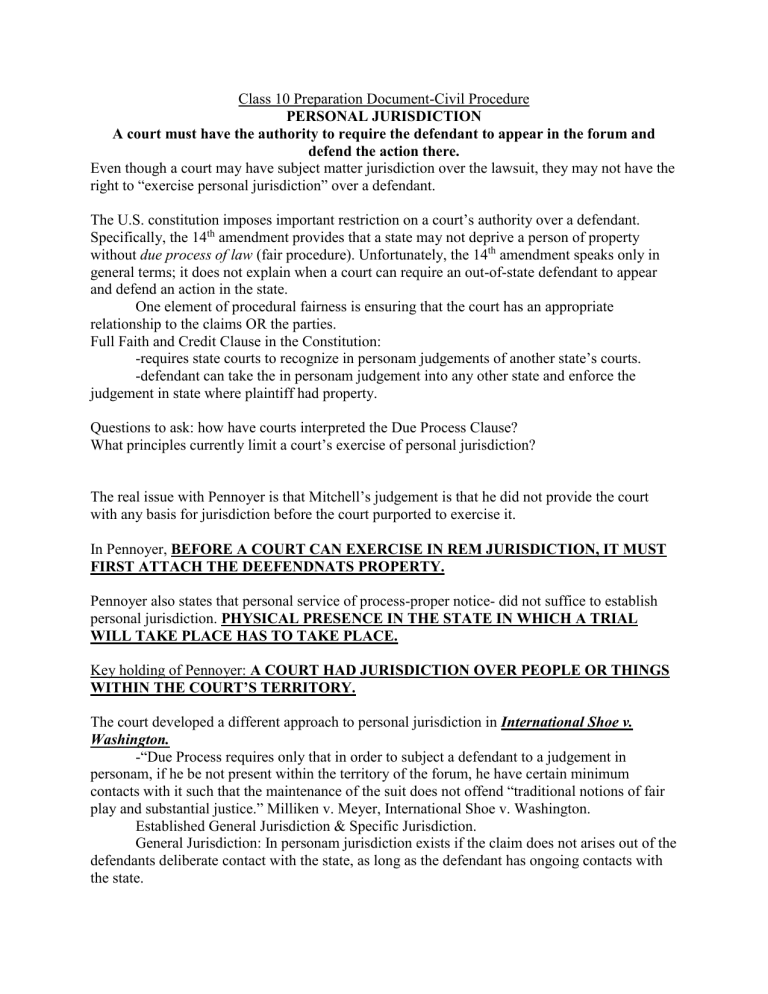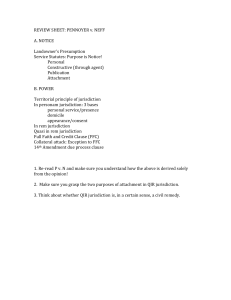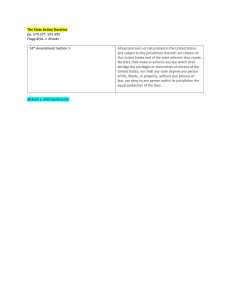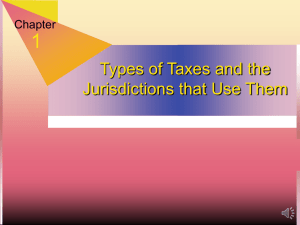
Class 10 Preparation Document-Civil Procedure PERSONAL JURISDICTION A court must have the authority to require the defendant to appear in the forum and defend the action there. Even though a court may have subject matter jurisdiction over the lawsuit, they may not have the right to “exercise personal jurisdiction” over a defendant. The U.S. constitution imposes important restriction on a court’s authority over a defendant. Specifically, the 14th amendment provides that a state may not deprive a person of property without due process of law (fair procedure). Unfortunately, the 14th amendment speaks only in general terms; it does not explain when a court can require an out-of-state defendant to appear and defend an action in the state. One element of procedural fairness is ensuring that the court has an appropriate relationship to the claims OR the parties. Full Faith and Credit Clause in the Constitution: -requires state courts to recognize in personam judgements of another state’s courts. -defendant can take the in personam judgement into any other state and enforce the judgement in state where plaintiff had property. Questions to ask: how have courts interpreted the Due Process Clause? What principles currently limit a court’s exercise of personal jurisdiction? The real issue with Pennoyer is that Mitchell’s judgement is that he did not provide the court with any basis for jurisdiction before the court purported to exercise it. In Pennoyer, BEFORE A COURT CAN EXERCISE IN REM JURISDICTION, IT MUST FIRST ATTACH THE DEEFENDNATS PROPERTY. Pennoyer also states that personal service of process-proper notice- did not suffice to establish personal jurisdiction. PHYSICAL PRESENCE IN THE STATE IN WHICH A TRIAL WILL TAKE PLACE HAS TO TAKE PLACE. Key holding of Pennoyer: A COURT HAD JURISDICTION OVER PEOPLE OR THINGS WITHIN THE COURT’S TERRITORY. The court developed a different approach to personal jurisdiction in International Shoe v. Washington. -“Due Process requires only that in order to subject a defendant to a judgement in personam, if he be not present within the territory of the forum, he have certain minimum contacts with it such that the maintenance of the suit does not offend “traditional notions of fair play and substantial justice.” Milliken v. Meyer, International Shoe v. Washington. Established General Jurisdiction & Specific Jurisdiction. General Jurisdiction: In personam jurisdiction exists if the claim does not arises out of the defendants deliberate contact with the state, as long as the defendant has ongoing contacts with the state. Contacts are important because they imply that the defendant has taken advantage of the benefits and protections of a state’s laws and defendants can control where they direct their activities. 1` Specific Jurisdiction: In personam jurisdiction exists if the claim arises out of the defendants deliberate contact with the state. 1. What is the principle of jurisdiction established in Pennoyer? 2. How could Mitchell, in the first suit, have obtained a valid judgment for his money, under the jurisdictional rules expounded in Pennoyer? 3. Does Shoe supersede Pennoyer, or does it simply add a separate, alternative basis for state assertions of jurisdictional power? Is it still valid after Shoe to serve the defendant in the state in order to obtain personal jurisdiction over her? 4. Does the test described in Shoe apply to natural persons as well as corporate, fictional persons? The court's discussion, read carefully, suggests an answer to this question. 5. Suppose it would not be inconvenient for the defendant to come into the state to defend (e.g., D lives in West Memphis, AR, and is sued in a court in Memphis, TN, a few miles away), but he still lacks minimum contacts with Tennessee. Could the Tennessee courts, under International Shoe, assert jurisdiction over him? Types of Personal Jurisdiction In Personam: Jurisdiction over the actual person; judgements are against the person and his/her assets (whenever those assets may be) o Defendant has either done something in the forum state or has a connection there o Any of the defendant’s property/assets, located anywhere, can be seized o Pennoyer Framework: (a) served personally and (b) residence (PRESENCE) within the state HYPO: under the Pennoyer framework, would the OR state court have had in personam jurisdiction over Neff if Neff had been served personally at his home in California prior to the state of the case? NO, b/c he must be served in OR In Rem: Jurisdiction over property for purposes of declaring ownership or interests in property with respect to the world. o Subject matter is the property itself, not necessarily over the owner o Only the specific property located within the state can be seized. o Ex. probate, bankruptcy o Pennoyer Framework: (a) must attach the land within the state, and (b) attachment must occur before the suit begins Quasi In Rem: A court’s assertion of control over a defendant’s specific property, that is located within the state where the defendant is sued. o subject is “interest” that may be related to property but between limited stakeholders (e.g., foreclosure: homeowner versus creditor) or unrelated to property o Pennoyer Framework: (a) must attach the land within the state, and (b) attachment must occur before the suit begins Attachment Jurisdictional attachment: bringing property into the action itself from in rem jurisdiction Pretrial attachment: attaches property to prevent defendant from getting rid of property before judgement can use it from damages Post- judgement attachment: garnishment—defendant doesn’t pay damages so court garnishes D’s property to satisfy a judgment. Personal Jurisdiction Case Evolution Pennoyer v Neff: Shady lawyer tries to get client’s property. Court claimed to have personal jurisdiction in Oregon; however, it was later found that the state did not because the client was domiciled in California. RULE: For individuals, in order to gain in personam jurisdiction, the individual must be served within the state seeking jurisdiction. o State has personal jurisdiction only on people served in the state, or if they had property in the state, they could attach that to the suit. Power of state over everything in its boarders. o State has personal jurisdiction over everyone in their state. No matter duration of visit, if you are present in the state, you are subject to jurisdiction (very broad) RULE: for in rem and quasi in rem, the property must be attached to the suit, and it must be attached before the suit begin. RULE: Defendant could consent to jurisdiction in the forum or waive the right to object o *Pennoyer became more problematic as the country became more mobile/interdependent between states. o A court may enter a judgment against a non-resident only if the party… Is personally served while within the state Has property within the state and that property is attached before litigation begins (as in quasi rem jurisdiction) “Reciprocal Duties”: If you are taking advantage of state benefits, you have a duty to the state. Hess v Pawloski: P and D got into an accident in MA. D went back home PA. P brought suit in MA. The court incorporated the non-present motorist act to est. personal jurisdiction over D, despite D not being present in MA. LONG-ARM STATUTE EST. that non-resident D automatically consented to jurisdiction in MA by driving on the roads and appointed in-state person (clerk) for service of process for D. Fictious Consent Theory: -pg. 163 RULE: Receive benefits of the state, then you can possibly be liable to the state’s laws o This is an example of implied consent and specific jurisdiction International Shoe v Washington: International Shoe had a handful of salesmen in the state of Washington for 3 years. D tried to claim there was no personal jurisdiction b/c they were not based in Washington, but court found that they had “Minimum contacts” in the state. This case defined specific and general jurisdiction. RULE: The D is not present within the forum state, it must have certain “minimum contacts” with state, such that, assertion of jurisdiction would not offend traditional notions of fair play and substantial justice. o Minimum Contact test: Contacts must be either (1) continuous and systematic with or (2) cause of action must arise out of D’s contact with the state. Look at quality and nature of the contact (how long you were there, how much money etc.)/ Connection of contacts to the dispute (there for business, contract dispute, etc.) Personal jurisdiction cannot offend traditional notions of fair play and substantial justice. Changes: made it possible to serve the D outside the forum state. Applies to cases where D is not in the forum state. Doesn’t overrule Pennoyer’s personal service rule. McGee v International Life: P’s son had an insurance policy through D. It began in another state, but later, the son moved to CA. the son sent the insurance payments from CA, and D sent a letter to CA to the son at one point. The court found these were sufficient contacts to grant personal jurisdiction. RULE: When a company intentionally reaches out to P in a different state and seeks business (even if it is just one transaction), the company is subject to in personam jurisdiction there. o Ex. of specific jurisdiction—cause of action arose from D’s activity with CA. o 3-part test: 1. Minimum contact 2. Claim has to arise out of the contact 3. Fairness and reasonableness o Policy: CA had interest to protect its citizens from dealing with non-present companies. Hanson v. Deckla: to establish specific jurisdiction, a plaintiff’s claim has to arise out of the defendant’s contacts with the forum. Hanson states: “It is essential in each case that there be some act by which the defendant purposefully availed itself of the privilege of conducting activities within the forum State, thus invoking the benefits and protections of its laws. “What intentional act did she make to go into the forum state?” The defendant has to have initiated a contact in the forum state. Absent such a contact, specific jurisdiction does not exist. Purposeful Availment Test World-Wide Volkswagen v Woodson: P bought car from dealership in NY. D was entirely located within NY, NJ, and a neighbor state. P was driving to new home in Phoenix when the car malfunctioned and caught on fire in OK. P brought suit against D in OK where they had to live temporarily while P was hospitalized. Court held that OK had no personal jurisdiction over D b/c there were no minimum contacts between D and OK. D had never purposefully availed themselves to OK. RULE: it is not enough that a product ends up in a state; the business must personally avail themselves to the state to an extent that its reasonably foreseeable that they will be asked to legally defend themselves in that state. RULE: D’s contact with forum state is still an essential requirement, even if PJ would be fair and reasonable in the case Foreseeability is not enough. o Factors for determining if contact is reasonable: REASONABLE TEST: Most important factor: the burden placed on the defendant Forum state’s interest in adjudicating the dispute P’s interest in obtaining convenient and effective relief Interstate judicial system’s interest in obtaining the most efficient result The shared interest in several states in furthering fundamental substantive social policies -Policy: D must have some control over where they subject themselves to litigation, otherwise PJ would be unfair to D. Burger King Corp v Rudzewicz- Rudzewicz applied for a franchise from FL based BK. Franchise in MI. Rudzewicz have never set foot in FL, but the K he signed had a forum, selection clause for FL. And he had a long-term business relationship with Burger King which was a citizen of FL. Rud failed to make payments. Bk terminated franchise and sued in FL. Court found that this was enough to grant PJ in FL over D. D also said litigating in FL would be unfair to them, but court did not think it was unfair enough. RULE: determining if a def satisfies min contact, court must look to the purposefully directed activates of the defendant toward the forum state. RULE: Burden on D to show that a forum is not just inconvenient, but unconstitutionally inconvenient RULE: A contract with someone in another state is not enough for min contact. Regular and systematic contacts must be created within the K to qualify for general jurisdiction. o Ex. if performance will take place in the forum state or if there a choice of law provision. Asahi Metal Industry Co. V Superior Ct of CA: Stream of commerce cases; both parties were international. Court split. Half found that putting the product into the stream of commerce was not enough for CA to have PJ, some found that it was and still others found that more was needed, but it was enough that a significant number of products were in the forum state. Stream of commerce ex. Widget maker in state A sells part to machine manufacturer in state B who sells product to consumers in states C, D, E o Machine manufacturer has final control over where widget maker’s parts end up RULE: Pure stream of commerce (BRENNAN/GINSBURG)- just putting the product in the stream of commerce means that you have personally availed yourself of any state in which it ends up o Plaintiff Friendly RULE: Stream of Commerce Plus (O’CONNOR/KENNEDY)- it is not enough to put it into the stream of commerce; company must intentionally avail themselves to the forum state in some additional way. o Ads, Channeling, Directing, Sales rep for state Plaintiff friendly RULE: Modified Stream of Commerce- same as steam of commerce plus, BUT this theory finds that if enough of the product ends up in a state, you’ve availed yourself o Volume of sale o Stream of commerce plus alternative o Alternative b/c there’s less intentionality. You don’t necessarily control where the volume of the sales go In a stream of Commerce fact pattern a single isolated sale in the forum is not sufficient for personal jurisdiction. Specific Jurisdiction: Minimum Contacts o Purposeful Availment (Hanson/Worldwide) Arise out of the Contact Fairness/Reasonableness Test (McGee/World-wide) o Most important factor: the burden placed on the defendant o Forum state’s interest in adjudicating the dispute o P’s interest in obtaining convenient and effective relief o Interstate judicial system’s interest in obtaining the most efficient result o The shared interest in several states in furthering fundamental substantive social policies Stream of Commerce: Does the stream of commerce constitute minimum contacts?






